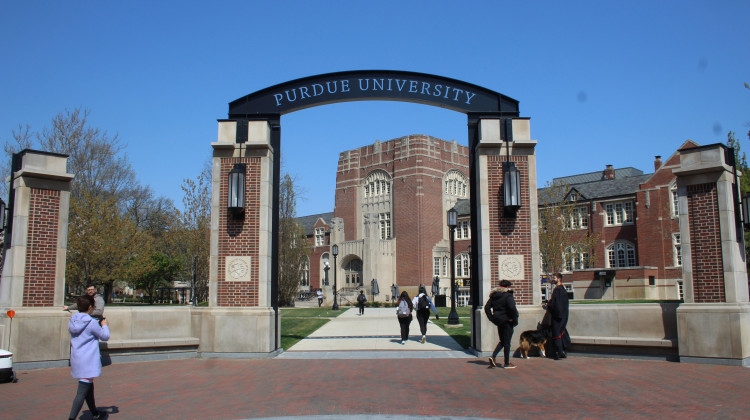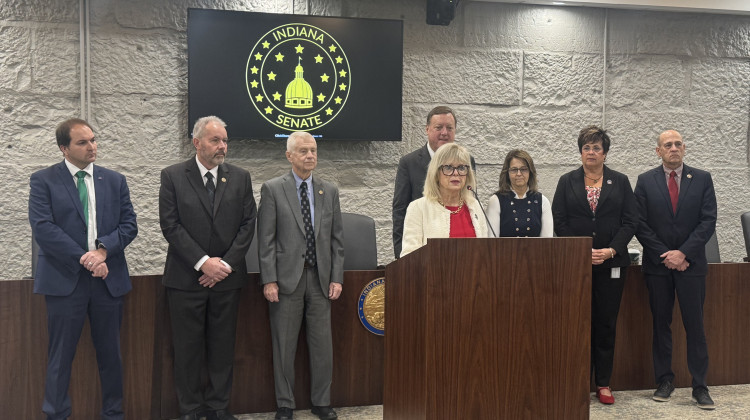
Purdue announces plan to explore nuclear energy generation alongside Duke Energy.
Ben Thorp/WBAA NewsPurdue University plans to explore advanced nuclear energy technologies in collaboration with Duke Energy to meet campus power needs.
In a press release Wednesday, Purdue President Mitch Daniels said the exploration is part of the university’s effort to “find ways to minimize the use of fossil fuels while still providing carbon-free, reliable, and affordable energy.”
Specifically, the school is looking at Small Modular Reactors, or SMRs, which are smaller than traditional nuclear reactors and can be built off-site and hooked into existing power grids.
Seungjin Kim is a professor of nuclear engineering at Purdue who will be part of the assessment process.
“We want to study whether SMR is feasible for our campus and we will investigate,” he said. “If it turns out to be feasible and sustainable and can make our Purdue campus carbon-free, I think it will go forward.”
Kim said the initiative is unique for a public university.
“There has been, worldwide, no university or educational institution that had this idea of providing zero-carbon energy to campus using nuclear energy,” he said. “It’s a giant leap in terms of considering the future energy source for generations to come.”
Nuclear energy provides a good baseload energy source, which means it excels at supplying more regular, predictable energy demands. That’s true whether it’s generated through traditional power plants or potentially through the SMRs.
But for peaks – when residents turn on their air conditioners on a hot day – different energy sources are needed to be able to respond more quickly. That source is generally natural gas.
“If the load fluctuation is there, then nuclear is not the ideal source,” Kim said. “You want to have a baseload and then have other sources that cover the energy fluctuation. It’s always good to have other options.”
According to Kim, SMRs are still about a decade away from being deployable in the U.S. But, he said, now is a good time for Purdue to begin exploring the technology.
Angeline Protogere is a spokesperson for Duke Energy. She said the reactors have small physical footprints and cost less than traditional nuclear plants.
“Advanced nuclear technology is still under development, and nationally we’re involved with institutions such as Purdue to explore its practicality, not only for Purdue but for Indiana,” she said.
The announcement comes after the university launched a new natural gas plant earlier this month, also in partnership with Duke. Some faculty raised concerns that the plant “locked-in” greenhouse gas emissions for Purdue’s campus and was a clear sign the university wasn’t exploring cleaner energy options.
The school is facing pressure from both students and faculty to begin transitioning away from fossil fuels in an effort to reduce Purdue’s contributions to climate change.
A group of Purdue students released a plan earlier this month outlining how the university could transition away from fossil fuels. Purdue is one of just three Big Ten schools without a plan to go carbon neutral.
And, during the Purdue faculty Senate meeting this month, there was a push to create a plan to divest the university from fossil fuels - although that effort ultimately failed.
All of these efforts come as the United Nations Intergovernmental Panel on Climate Change, which compiles all of the latest research on global warming, warns that global carbon emissions must peak by 2025 in order to avoid more than 1.5 degrees of warming. That’s a threshold scientists say will limit the impacts of extreme drought, extinctions, and water availability, among other things.
Jeff Dukes is a professor of forestry and natural resources at Purdue and the former head of the Purdue Climate Change Research Center. He said there’s a lot to like about advanced nuclear technologies - even when using them is not yet a reality.
“In my opinion, this is a topic that needs to be explored, it needs to be worked on. It has the potential to be scaled up and generate a lot of carbon-free electricity around the world, not just at Purdue,” he said.
But Dukes points out that the exploration does not amount to a commitment from either Purdue or Duke Energy.
“It’s a long way from being money in the bank in terms of the climate. It’s a long way away from carbon being kept out of the atmosphere,” he said. “I can’t really be critical of it at all. This is the sort of thing we need to be doing. But right now, at this stage, it’s more of a PR win than a climate win.”
The evaluation, which will include meetings and several studies, is set to begin “in the coming weeks” according to Purdue.
9(MDAyMzk1MzA4MDE2MjY3OTY1MjM5ZDJjYQ000))
 DONATE
DONATE






 Support WFYI. We can't do it without you.
Support WFYI. We can't do it without you.